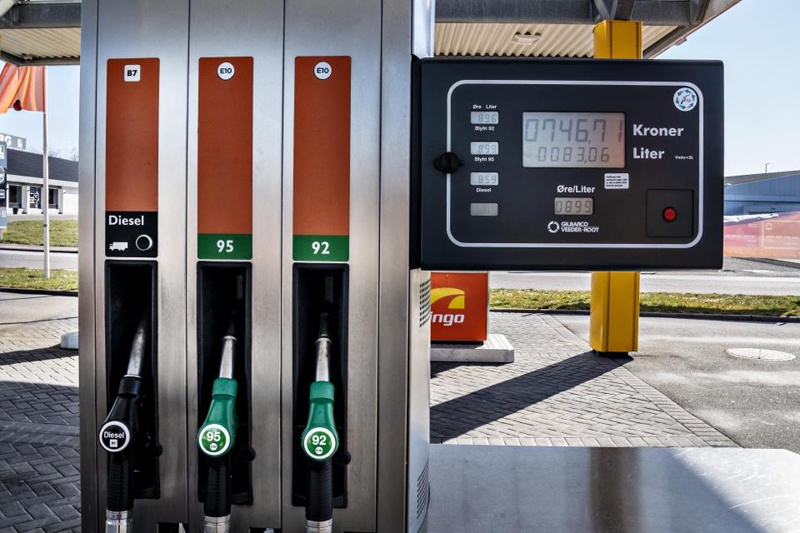 Energy prices fell in the Eurozone by 1.7% in February compared to a year ago. - AFP
Energy prices fell in the Eurozone by 1.7% in February compared to a year ago. - AFPBRUSSELS: The rise in eurozone consumer prices steadied in February, official data showed yesterday, as the slump in energy prices sharply slowed despite the enduring pandemic. The Eurostat agency said inflation in the 19 countries that use the euro ran at 0.9 percent last month, the same as in January.
January's rate marked a big leap after several months of negative inflation due to the slumping consumer demand caused by the coronavirus and restrictions to the economy across Europe. The rise in prices in 2021 has stoked talk that the European Central Bank should consider reining in its massive stimulus program, even if inflation remains below the ECB's near two percent target. A global debate over the resurgence of inflation has heated up as the US sets out to rollout a $1.9 trillion stimulus plan to reboot the economy.
Europe's spending stimulus has been less ambitious, but markets have signalled expectations that inflation will rise in the coming months, with borrowing prices for EU governments increasing. Eurostat said that energy prices fell by 1.7 percent in February compared to a year ago, instead of the negative 4.2 percent seen in January and the even deeper drops seen last year. Those arguing for the ECB to keep helping the economy will point to core inflation, which strips out volatile components like energy and food. Eurostat said core inflation fell in February to 1.1 percent, from 1.4 percent in January, indicating that the European economy has yet to enter a high gear.
Meanwhile, German unemployment was stable in February, official data showed yesterday, despite the pain of prolonged shutdowns to slow the spread of COVID-19. The seasonally adjusted jobless rate in Europe's top economy stood at 6.0 percent, the same level as in January, according to the BA federal labor agency. However, the number of unemployed people rose slightly for the first time since June, with an extra 9,000 people out of work.
In total, there were 509,000 more people unemployed than in February 2019. Germany closed restaurants, bars, gyms and cultural centers in November before adding schools and non-essential shops in December as it was hit by a second coronavirus wave. The measures have since been extended until March 7, though some schools, hairdressers, attractions and shops have been allowed to reopen in parts of the country.
The shutdowns have prompted employers to rely more heavily on a government-subsidized scheme that allows them to reduce workers' hours so as to avoid outright layoffs. Another 500,000 employees were placed on the short-time working scheme in February, compared with 745,000 in January. A total of almost 2.4 million workers were on short-time working arrangements in December.
"Short-time work continues to secure employment on a large scale and prevents unemployment," BA chairman Detlef Scheele said. The average German worker saw a drop in real wages in 2020 for the first time since 2007, according to federal statistics agency Destatis. Germany recorded 3,943 new COVID-19 cases in the past 24 hours yesterday and 358 deaths, according to the Robert Koch Institute health agency. Chancellor Angela Merkel and German regional leaders are due to meet again today to discuss possible further relaxations of the shutdown measures.
Germany exported 30 percent less goods to Britain in January compared to a year ago, official estimates showed yesterday, with demand hurt both by Brexit and the coronavirus pandemic. Federal statistics agency Destatis said German exports to Britain have been declining since 2016, the year when the UK voted in a referendum to leave the European Union. But the drop in demand has sharply accelerated over the last year.
For 2020, German exports to Britain declined 15.5 percent compared to 2019, marking the biggest drop on an annual basis since the financial and economic crisis of 2009. German exports to Britain were worth 66.9 billion euros, compared with 89 billion euros in 2015 before the Brexit vote. Likewise, Germany imported less from Britain over the last year, at 34.7 billion euros marking a drop of 9.6 percent from 2019.
The decline was most dramatic in the second half of the year when shipments plunged 16.2 percent compared with a fall of 2.5 percent in the first six months of 2019. British exporters and cross-Channel freight hauliers have encountered severe delays and disruption since Britain departed the EU market. But European leaders see this as the inevitable consequence of the UK government's decision to pursue a complete break from the EU. - AFP









